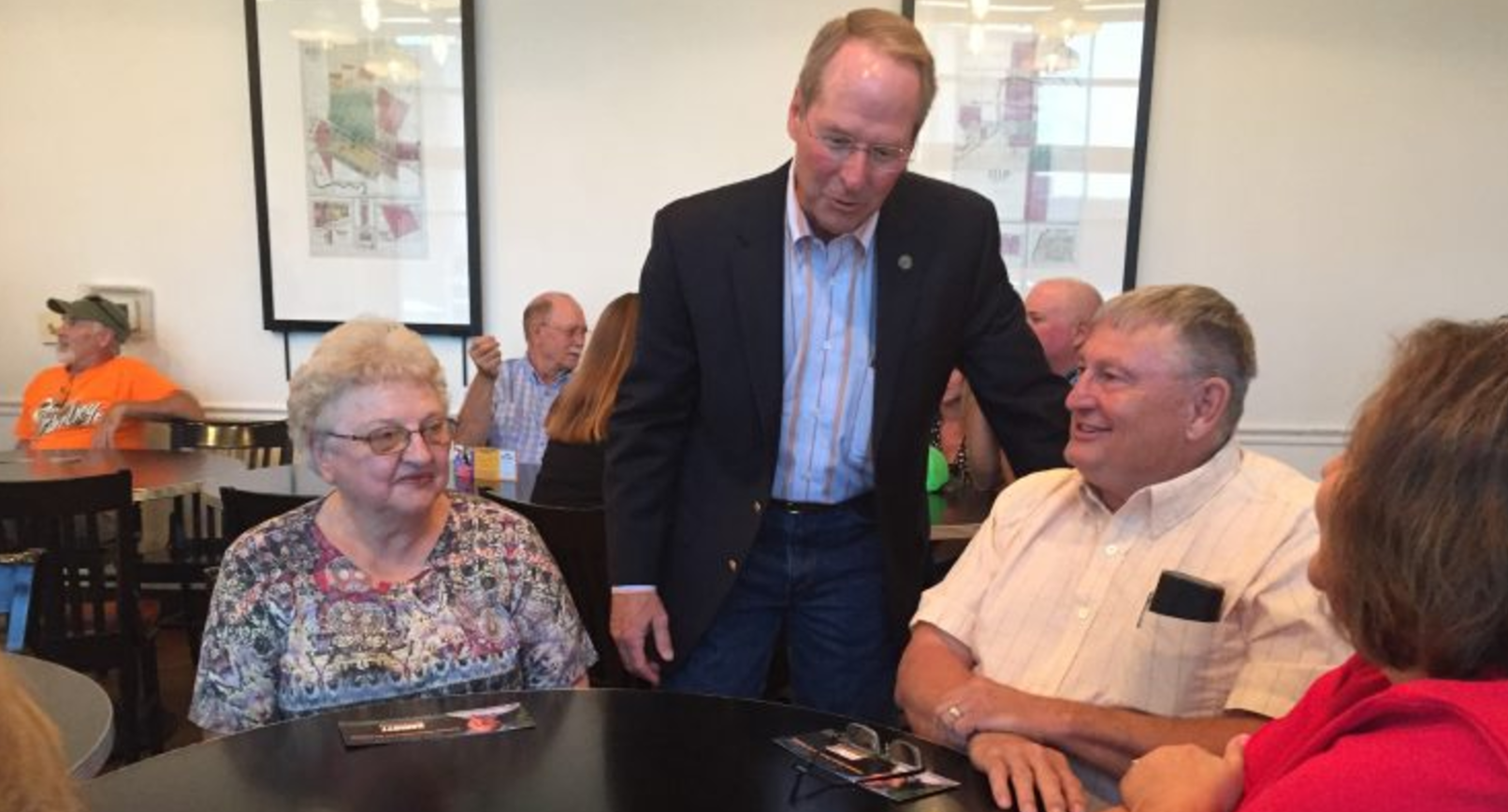
By BECKY KISER
Hays Post
It was Dr. Jim Barnett’s last stop of a two-day campaign announcement tour of Kansas and a homecoming of sorts for two of his young staff members who have ties to Hays, WaKeeney, Ransom and Bazine.
Barnett and his entourage were in Hays Wednesday afternoon, spreading word of his intention to run for governor in 2018.
A life-long Republican, Barnett is a practicing physician of 35 years and lives in Topeka. He grew up on a farm near Reading on the edge of the Flint Hills. His fiance also grew up on a farm, near Americus. Barnett served as a state senator from 2001 to 2010 for the Emporia area and is a past president of the Emporia school board.
In 2006, Barnett won a seven-way primary and was the Republican candidate for governor.
“The best years of my public service came when I was on a school board,” Barnett declared, “and it’s when I got to rub shoulders with educators. I knew how important their job was for the future of those children.”
“I want to make it clear that education is critical to our future in Kansas, not just K-12 but also early childhood education. Higher education is also critically important especially when it comes to workforce development.”
As governor, Barnett said he wants to support and fund schools.
“I want schools funded year after year so we’re not back in the courts. I want our decisions made by parents and by educators in the classroom and not in the courtroom.”
State legislators battled through an extended 2017 session in reaching a new school funding formula, which increases aid to schools by $284 million within two years. The fate of the new K-12 formula is now in the hands of the Kansas Supreme Court. The justices found the state’s current funding system unconstitutional in the ongoing Gannon v. Kansas school finance lawsuit, in which dozens of school districts are suing the state over funding levels.
“I applaud those legislators who made that very difficult vote. The Kansas tax experiment almost brought us to our knees,” Barnett said.
The end of most of Gov. Brownback’s tax cuts was made official with the passing of SB 30. The bill was passed by an override of the governor’s veto. The legislation repeals the non-wage business income tax exemption for small businesses going back to Jan. 1, 2017.
The internal medicine doctor supports expansion of Medicaid in Kansas, which is opposed by Brownback. “That’s a short term solution. There’s an intersection of out-of-control healthcare costs and people who work and still can’t afford healthcare,” said Barnett.
“Long term, I expect President Trump and Congress to issue block grants for Medicaid,” he predicted. “So the next governor better have a passion and an understanding because in Kansas we’re gonna have to figure out how to take care of a lot of people with limited resources.
“I welcome that challenge because that’s what I’ve been doing for 35 years. We need to have access to quality healthcare in our communities if they’re going to stay alive.”
Barnett also talked about the importance of infrastructure. “If we don’t have good roads and bridges, air travel and rail, we can’t grow economically. We need to restore funding to the Kansas Department of Transportation.”
The only way to pay for it all long term is to grow the state’s economy, according to Barnett. If elected governor, he plans to involve community business leaders and ask them what they need to do better and how the state can help.
Clare Gustin, a Sunflower Electric vice-president who works with the western Kansas Rural Economic Development Alliance, pointed out that “rural development takes more money, takes more creativity and takes longer than in urban areas.” “When a legislative body looks at (only) how many jobs were created, that doesn’t tell the whole story in rural communities. We have to have a balanced approach. Two jobs in a small community is like 200 jobs in Johnson County,” Gustin said.

Barnett agreed.
“I don’t see this as a top-down effort. I want this to be business and industry-driven,” he responded. “When it comes to accountability, I’ll ask them what they need to know and they’ll tell me. Then they’ll tell their election officials to support it, because it’s jobs.
“I think the most important appointment I will make as governor is the Secretary of Commerce. We need a relationship that is joined at the hip. It’s vital to growing the state’s economy.”
When asked about the rural versus urban divide in Kansas, Barnett talked about what is common to all Kansans including agriculture and water supplies.
“I’m proud we’re an ag state and I want all Kansans to recognize that. It’s a huge part of our economy and we cannot afford to lose that base. That’s 70,000 farmers, ranchers and producers eventually transporting out $5.5 billion of ag products to other places (annually).”
There has been preliminary talk at the state level of moving water from northeast Kansas to western Kansas through an open channel.
“That doesn’t quite mesh with me, but maybe that’s how we do it,” Barnett said. “Water affects all of us. It’s not only western Kansas that has water (shortage) issues. Eventually, eastern Kansas will as well.
“There are short-term and long-term needs. Obviously conservation, new technologies for watering and measuring soil moisture which also provide the opportunity to bring high-tech jobs into the state, research for new crops and new crop usages, these involve the entire state.”
 Uniting Kansans is the focus of Barnett’s campaign with his #OneKansas agenda.
Uniting Kansans is the focus of Barnett’s campaign with his #OneKansas agenda.
“We’ll never solve our issues unless we come together,” he said, “and I believe it’s high time we did that.”
